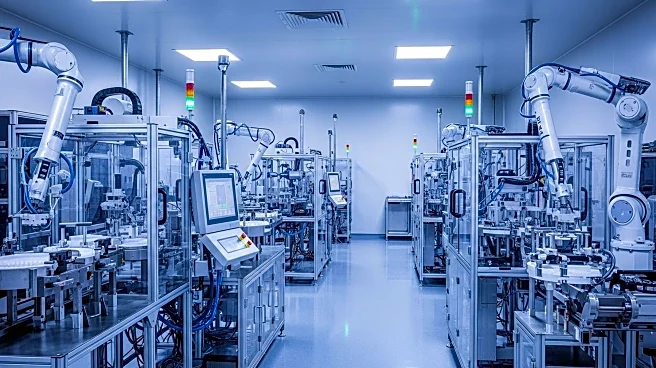What is the story about?
What's Happening?
Pharmaceutical companies are making significant investments in manufacturing to compete in the lucrative obesity drug market. Metsera and Viking Therapeutics have secured production capacity for obesity drugs after reporting early-phase data. Metsera's efforts culminated in Pfizer acquiring the company for nearly $5 billion, highlighting manufacturing cost advantages. Larger companies like Amgen and Roche are also investing heavily, with Amgen committing $1 billion to a facility in North Carolina and Roche investing over $700 million in a metabolic medicines plant. These investments are aimed at meeting the scale demands of the obesity market, which affects over a billion people globally. The focus on manufacturing is seen as existential, with companies partnering with generics manufacturers to access drug production capacity and innovate at the peptide level to reduce effective doses.
Why It's Important?
The investments in manufacturing by pharmaceutical companies are crucial as they aim to capture a share of the growing obesity drug market. This market presents a significant opportunity due to the high prevalence of obesity worldwide. By securing manufacturing capacity early, companies can ensure they meet the demand and compete effectively against established players like Eli Lilly and Novo Nordisk. The strategic focus on manufacturing not only addresses production scale but also aims to reduce costs, making drugs more accessible. This could lead to increased competition, potentially driving down prices and improving access to obesity treatments. The investments also reflect a shift in industry priorities, emphasizing the importance of manufacturing alongside clinical development.
What's Next?
As companies continue to invest in manufacturing, the next steps involve scaling up production to meet market demands. Roche plans to break ground on its new facility by the end of August, while Boehringer Ingelheim is conducting Phase III trials for its obesity drug candidate. The focus will be on optimizing production processes and managing yield to reduce costs further. Companies may also explore strategic partnerships to enhance their manufacturing capabilities. The competitive landscape is likely to intensify, with pricing dynamics playing a crucial role in determining market success. Stakeholders will closely monitor these developments, as they could influence drug pricing and availability.
Beyond the Headlines
The emphasis on manufacturing highlights broader industry trends, including the need for scalable solutions in drug production. This shift could lead to long-term changes in how pharmaceutical companies approach drug development, prioritizing manufacturing efficiency alongside clinical efficacy. The partnerships with generics manufacturers suggest a move towards more collaborative approaches in the industry, potentially leading to innovations in drug delivery and production techniques. These developments may also have ethical implications, as companies balance cost reduction with ensuring drug quality and safety.


















